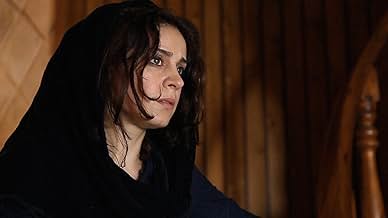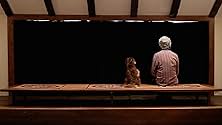www.theframeloop.com
Directed alongside fellow Iranian and the criminally underrated filmmaker Kambuzia Partovi, Panahi's latest manifests the same vehemence for the tyrannical Iranian government as in last year's deconstructionist documentary This Is Not A Film. His first full length feature film since 2006′s brilliant Offside, Closed Curtain is a more aggressively political comment on the creative restrictions he has bestowed on him, and his unrelenting perseverance to conquer them.
With the Iranian government banning citizens from owning dogs as domestic pets (harrowingly, a true sanction), an unnamed screen-writer (played expertly here by co-director Partovi) flees to a remote beachside villa with his furry best friend, a beautiful little dog called 'Boy'. In constant fear that he will be caught – with the dog left for dead – the erratic scribe quite literally shuns the outside world, barricading the doors and blacking out the windows. Stuck in their new, isolated sanctuary, the man and dog are paid an unexpected visit by two young Iranians (Maryam Moqadam and Hadi Saeedi). Like our hero, they too are on the run from corrupt state officials.
Forty-five minutes in, the austere, naturalistic situation is dispelled by an indulgent second half with many increasingly odd moments. These include the visionary's quintessential reflexive streams of consciousness moments; a break in the fourth wall with Panahi's jarring on-screen presence; and a discombobulating critique on the very unorthodox nature of filmmaking and hiding from the reality that lies beyond the camera lens. Some of these moments are unnerving in all the right, satirical ways, whereas some of these 'experiments' are so dispiritingly chaotic that one would think they were coming from filmmakers of far younger vintage.
In one particularly seething encounter, a friend of Panahi's suggests to the on-screen director that there is more to life than work; to which the candid director suggests that all other things are 'foreign' to him. After countless censorship cases and one two year long house arrest, it's perhaps unsurprising that Jafar Panahi is so entrenched in – and haunted by – his nefarious creations that he has become removed to the life outside. Stuck on a critical parapet, Closed Curtain takes a panoptic glance at silenced Iranian society, without ever feeling like he is gallantly speaking for it as he has done previously with Crimson Tide and The Circle. The result means that this clunky social commentary feels like it can only resonate in an audience of a similar distance – that of a Scandinavian film festival, perhaps – rather than the homegrown audience he has become the audacious patron of.
Despite an endearing first half, the drama wallows for too long in opaque political allegories and slight-of-hand trickery. Considering the limitations and policing these filmmakers encounter on a daily basis, it seems churlish to quarrel about the film's production values. Even still, it must be noted that Closed Curtain has some of the most horrendous sound recording and mixing I've witnessed in recent memory.
Forgetting these flaws, there is one half of an exceptional, poetic drama hiding behind the curtain here. An alienated chamber piece, Panahi and Partovi highlight the grave situation facing artists and freedom of expression in an otherwise oppressive Iranian regime. For, as long as they continue to fight the system from within and make films, I am happy to watch and recommend them.
www.theframeloop.com






















